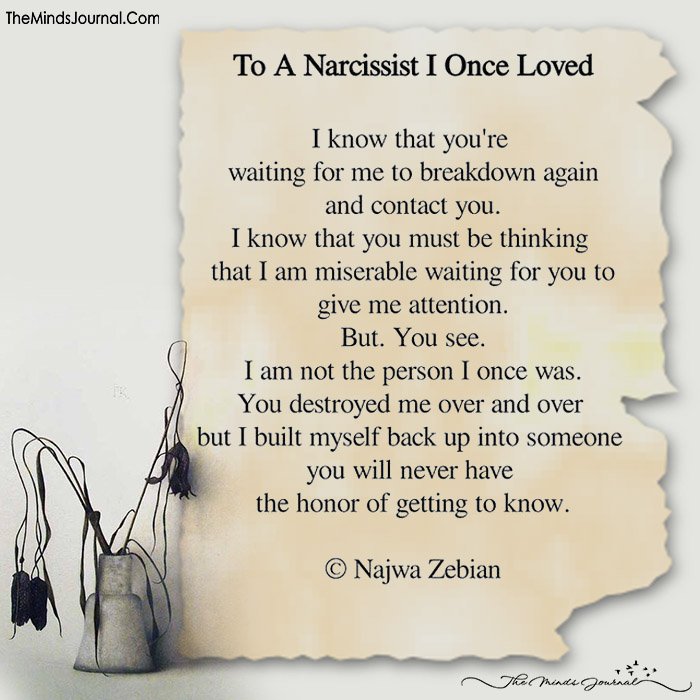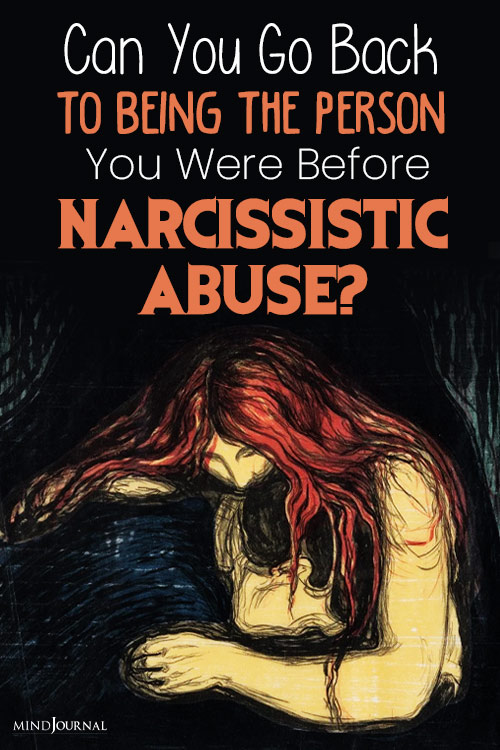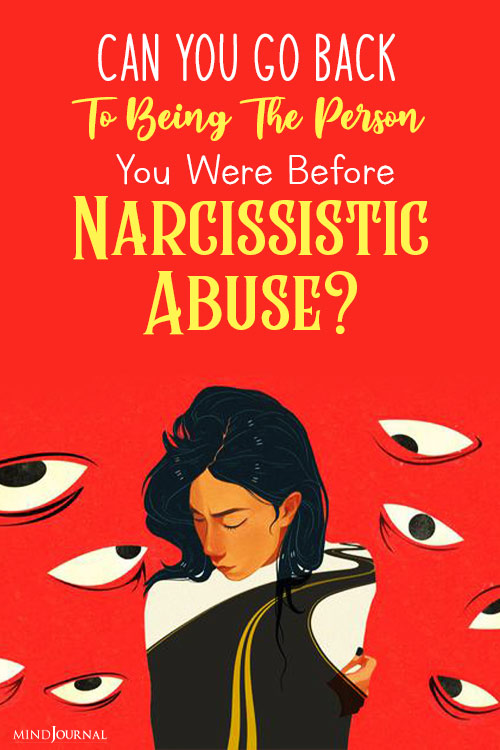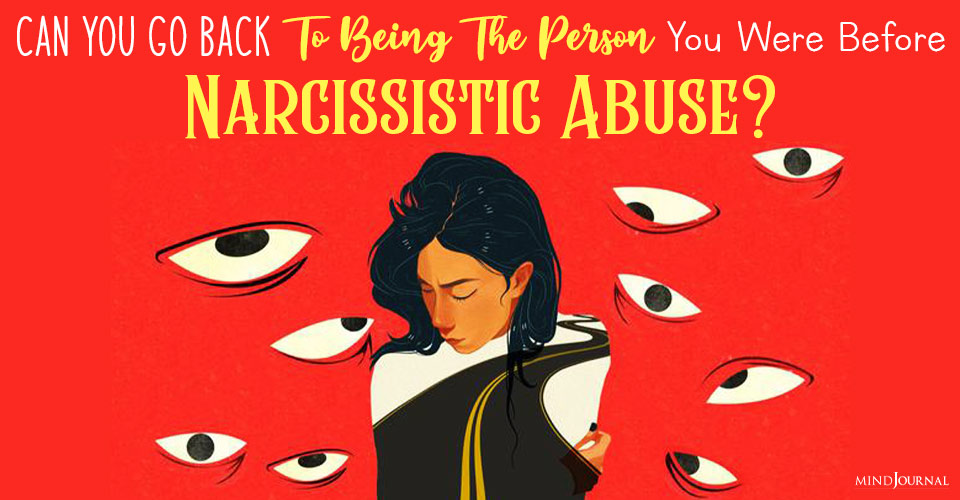Over the years of manipulation, accusation, and coercive control, it’s completely natural to think that you will not be the same again. All of these forms of narcissistic abuse create feelings of low self-worth and leave a mark on your emotional and mental health, sometimes physical too. But once you take the first step of breaking free, you’re on the journey to finding a better and much stronger version of yourself. Just take it.
When you’ve dealt with narcissistic abuse for a long time and you finally get out, you’ll spend a lot of time first grieving and then healing. The narcissistic abuse recovery process can be long and complicated but at some point, you’re going to want to start “being your old self again.” You know, the self you used to be – before you met the narcissist.
And listen – I absolutely get it. I felt that way too. Who doesn’t want to get their old self back after going through a whole self-altering toxic relationship? After all, you’ve been walking around feeling like a ghost or a shell of yourself.
The narcissist caused you to put all of your own interests on the back burner, or maybe they shamed you out of actually even thinking about the things you once enjoyed. It makes total sense that you’d want to feel like yourself again.
Can you become the person you were before narcissistic abuse?

So, I’ve got good news for you, and I’ve got bad news. First, the bad news: here’s the thing. You’re never going to be able to become your old self again.
But don’t stress too much because, with that being said, here’s the good news: you can most certainly become an even more amazing version of yourself. Even better? When you create your new self with intention, you can almost literally become exactly the person you want to become.
Read: Signs You Are Healing
Desperately Seeking Self
There might be a part of you that feels angry and overwhelmed by the idea that you can’t get your old self back. So before I tell you why you can’t be exactly who you were before narcissistic abuse, I want to remind you of something really important here.
You’ve got to first be compassionate with yourself and realize that you have been through an abusive relationship with a narcissist who did everything possible to tear you apart.
Most likely, you did not realize how profound the damage was until the relationship ended – because often, narcissists keep us in a sort of “spinning” state, where we are so busy trying to get through the days without upsetting or angering them that we don’t have time to slow down and recognize the extent of the effects of the trauma.
And now, here you are, maybe riddled with depression and anxiety, and if you’re anything like most other survivors, you might also be suffering from C-PTSD (complex post-traumatic stress disorder) and/or other related issues.
You can absolutely heal and you can totally take your life to the next level. But your old self is gone. And that might feel really scary.
Why You Can’t Be Your Old Self Again After Narcissistic Abuse
Is it really true that your old self is gone after enduring narcissistic abuse? In so many ways, yes. But is there a way that you can go back to being the person you were before the abuse? Not exactly – but at the very least, you can heal and move forward and live a satisfying life.
Still, there are a couple of pretty simple reasons that you won’t be able to become exactly who you were before narcissistic abuse.
1. Time Changes Everything
First, let’s look at the practical side of things – there’s the fact that time has passed. Maybe you’ve had kids. You’ve had more experiences. And you’re older now. You might have been in this relationship for 20 years – or maybe your whole life, if the narcissist you’ve dealt with was a parent or family member.
Even without the trauma, you’d be a different person today than you were when you began the relationship. Time changes everything, and you are no exception.
2. Trauma Changes YOU
And then, there’s the science of trauma. See, the ongoing trauma of narcissistic abuse changes you. It changes who you become. It changes what might have been a happy, confident, secure person into someone who doubts their worth and their value every day.
It takes away your ability to have a healthy, full life and causes you to hyper-focus on it as you try in vain to resolve it, repeatedly, over and over again. All of this ongoing abuse and trauma leads to literal brain damage. That’s right. Narcissistic abuse causes brain damage and brain damage of any type changes you.
Here is just a quick overview of how that happens.
There are three significant parts of the brain, including the amygdala, hippocampus, and cortex.
1. The amygdala
The amygdala is the area of the brain that is known as the ‘fear center’. Each time you become scared or anxious, that area is activated. It also keeps the memories of the abuse in it and each time anyone talks about it, that activates the amygdala. the abuse you had endured is what caused the fear center to keep activating. And the constant activation of the fear center will cause it to increase. This can lead to mood disorders and anxiety disorders.
2. The hippocampus
Then there is the hippocampus which is the area of the brain that stores short-term memories (which it then converts into long-term memories). The hippocampus dictates how and when you can learn anything new.
However, uncontrolled stress will shrink the hippocampus. So, as you might imagine, the constant stress you’re dealing with when you’re in a toxic relationship with a narcissist will shrink. This leads you to struggle more with learning new things in addition to being extra forgetful.
3. The cortex
And finally, there is the cortex of the brain. This is the area of the brain that is located right behind the eyes. This is the area that is in charge of planning, making decisions, attention, and memory. The cortex also shrinks the same way the hippocampus does when you are under too much-uncontrolled stress.
This causes decision-making to become a challenge. Your attention span gets shorter. You’re far more likely to deal with depression. You might be dealing with apathy, meaning you just don’t feel like you can do anything at all – that feeling of being just stuck. And you stop caring about yourself. You might even stop showering or brushing your teeth. Self-care becomes a thing of the past.
But the good news is that the brain can be retrained, and you don’t have to feel stuck in this trauma loop forever. And there are things you can do on your own at home to actually start to sort of “rewire your brain.”
That is thanks to neuroplasticity.
Neuroplasticity offers hope for survivors of narcissistic abuse like nothing else. See, this is how our brain can “rewire itself” by forming new neural connections throughout life. This means that the neurons (nerve cells) in the brain can compensate for injury and disease and to adjust themselves in response to new situations or to changes in their environment.
Even better, we can intentionally control this process if we choose to do so. I’ll link to a video with additional information about this in the description below.
Read: Common Signs Your Brain And Body Are Under Stress
How to Become the Best Possible Version of Yourself After Narcissistic Abuse
So, thanks to both time and the effects of the ongoing trauma you experienced in a toxic relationship with an abusive narcissist, you cannot technically be exactly the same person you were before enduring narcissistic abuse. I mean, if we’re being honest, any profound experience changes you. But again, you can heal and move forward. Let’s talk about how you can do that.
Feel Your Feelings
When you’re in a relationship with a narcissist, you learn really quickly how to ignore your own emotions. You learn that your feelings don’t matter, at least not as much as the narcissist’s feelings. And so, when you get out of the relationship, you might keep going in that direction. For me personally, that was one of the worst things that I dealt with – forgetting how to feel my feelings. And honestly, I didn’t even WANT to feel them!
The truth is that one of the most significant mistakes I made in my own recovery was shoving my feelings down and trying to move on without feeling them. I really believed that this was the right thing to do at the time – I didn’t like how it felt to deal with those emotions and I didn’t fully know how to process them. It wasn’t until several years later – when I still hadn’t managed to heal – that I really got my head around this concept.
That’s why, when I work with my narcissistic abuse recovery coaching and counseling clients, I make a point of teaching them how to feel their feelings and how to move forward from there. You can work on this at home by taking some time to sort of grieve the relationship.
Cry, scream, throw things, break things – whatever you need to do to get through those emotions. It sucks, but you’ve got to do it if you want to take the next step toward healing.
Time Soothes Trauma
In addition to allowing your feelings to flow, you’ve got to give yourself the time you need to heal. Let’s face it – there’s a chance that you may not be 100 percent healed because triggers and reminders of the abuse will come up. Even if you get to the point of handling it well, you can still be affected one way or another.
This is the time to get to know yourself again. Depending on your circumstances and the specifics of your situation, you might need to find a therapist, counselor, or coach who specializes in narcissistic abuse recovery to help you find yourself again.
Most importantly, remember that is no standard time limit for healing – each of us is a little different and will have different needs. You need to do what feels right for you, and to take as much time as you need to heal.
Firm Up Your Boundaries
During the relationship with the narcissist, your boundaries were repeatedly crossed, and no matter how firmly you’d had them set before, you might have almost forgotten how to set and stand behind them.
When you are healing from narcissistic abuse, you’ve got an opportunity to learn or relearn how to set firm boundaries and how to ensure that they stick. And honestly, setting boundaries is not only necessary for your healing and continued wellbeing, but it is literally one of the best forms of self-care around.
Whether it happened before or during your relationship, you might have been a people-pleaser – and while you don’t have to be rude or disrespectful to someone to enforce your boundaries, it might feel a little unnatural to you at first.
Read: 8 Tips to Developing Better Boundaries in Your Life
Forgive Yourself for What You Didn’t Know
Maya Angelou once said, “Forgive yourself for what you didn’t know before you learned it.”
I love this quote because it so perfectly expresses one of the most important things about narcissistic abuse recovery. Most survivors are relatively intelligent people who can easily read most other people.
That’s why we are so likely to blame ourselves and beat ourselves up for taking the abuse as long as we did. And listen – I totally get it.
It is easy to blame yourself for not realizing what was happening and for accepting the abuse, and if you’re anything like me, you might be beating yourself up about it. You wonder how you fell for it – why you allowed it to happen in the first place, or why you didn’t leave sooner.
Some small part of you might even secretly think you deserved it all along. But my friend – it is not your fault. You did not sign up for this relationship with the full knowledge of what would happen. You certainly didn’t know that you’d be forced to endure narcissistic abuse. And for the record, you definitely did not deserve it. No one deserves this.
So take the time to acknowledge that you have encountered a traumatic and devastating situation, and recognize that, regardless of how you feel today, at one time, your ability to accurately perceive the situation may have been sort of clouded by your feelings for the abuser.
Once you’re out, your perception will start to get clearer – and while it might take a little time, you’ll get to the point where you can see the truth.
Read: 15 Ways To Be Kind To Yourself (Especially When Feeling Down)
Rewrite Your Story
Years ago, I wrote a course called Rewrite Your Story for narcissistic abuse survivors. (And then there’s this book on the same topic!) That’s because, so often, we sort of “misidentify” ourselves or see ourselves in a skewed way, thanks to the lies and gaslighting thrust our way by the narcissistic abuser in our lives. Basically, the way the abuser saw you is how you see yourself, at least on some level.
Now, you probably recognize that you’ve been gaslighted, and you realize that the abuser had every intention to ruin your self-esteem. You probably understand that this was all about control and keeping you “in your place” so that you could continue to provide narcissistic supply, while not realizing that you were really too good for the narcissist.
A narcissist has known this all along, and that’s why they play these mind games – they don’t want you to recognize it and leave them.
Now, you struggle with low self-esteem because you see yourself through the narcissist’s eyes. When you begin to see your worth, you can really start to rewrite your story and realize that what the abuser said about you and you were a rubbish pile. If you’re struggling with this, you can work with a narcissistic abuse recovery coach, a therapist, or even do it on your own by taking my Rewrite Your Story course.
Remember That Knowledge Is Power
Before you got into an abusive relationship, you might not have known what kinds of warning signs or red flags you should watch for to keep yourself safe. Narcissistic abuse is so subtle and pervasive that you can literally be right in the middle of it and not see it. Or, maybe, like probably 90 percent of narcissistic abuse survivors, you were raised in an abusive family or had some other kind of trauma in childhood.
This would lead you to have both a higher threshold for abuse as well as trouble setting boundaries. Your expectations for a relationship may have been lowered as well, and because toxic might have felt sort of “normal” for you, you might have tolerated or overlooked the early signs.
But now, you’ve recognized what you’ve had to deal with, and you may have even had a full-on epiphany that led you to this point. And, now that you know more about what a toxic relationship looks like and what kinds of behaviors are not acceptable to you, you are empowered to make better choices in the future. Knowledge really is power when it comes to healing from and growing forward after narcissistic abuse.
The bottom line is that while you may never be the person you were before the narcissistic abuse, you can absolutely heal and become the person you want and deserve to be afterward. You with me?
Read: The Connection Between Mindfulness And Recovery Success
Written By:ANGIE ATKINSON Originally Appeared On:Queenbeeing.com Republished with permission.










Leave a Reply
You must be logged in to post a comment.